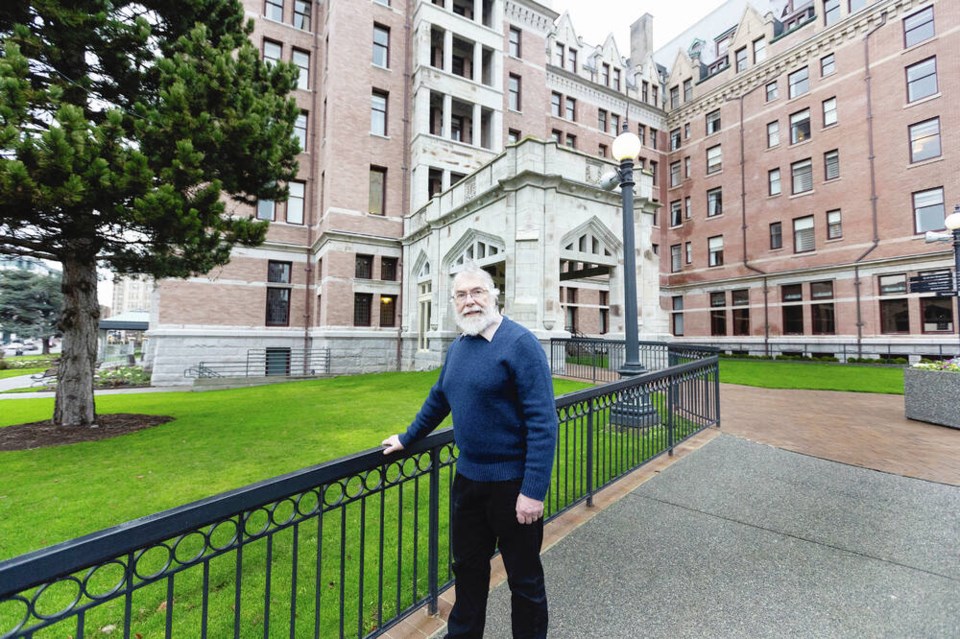Chambermaid Lizzie McGrath stepped onto the Empress Hotel fire escape to say her rosary, just as she did every night before retiring to her sixth-storey room.
Alas, what Lizzie didn’t know was that a contractor had disassembled the platform. She plunged to her doom.
That was in 1909, the year after the hotel opened.
It wasn’t the last we heard (or saw) of poor Lizzie, though. Oh, no. Every so often someone will sense a presence, or feel a room suddenly turn cold. There are even stories of a woman in starched white cap and apron passing right through a wall.
John Adams remembers hearing such tales when he worked at the Empress during his student days in the 1960s. “Her ghost is seen up on the sixth floor,” he says.
In modern times, Adams is better known for his history tours of Victoria, including one called Ghostly Walks. It was, therefore, no surprise to him to learn the Fairmont Empress has been named by Condé Nast Traveler as one of .
In truth, Adams says, most places qualify as haunted if you look closely enough. “There are ghosts everywhere in the city.”
And ours is far from the only town to titillate tourists with scary yarns. “Haunted tourism is, believe it or not, a pretty popular thing.”
A lively niche market caters to travellers keen on sharing a room or restaurant with the dead. Tourists flock to other destinations on the Condé Nast list, which range from Florence, Italy’s Hotel Burchianti, where a child occasionally skips down the hall and an elderly woman knits in a chair, to Ruthin Castle in Wales where, even if you miss a run-in with Lady Jane Grey — executed for treason in London in 1554 — there are still the remains of the dungeons, whipping pit and drowning pool to enjoy.
In Victoria, the Empress’s age and large size give it plenty of potential for ghost stories. First, there’s Lizzie. At least, that’s whom they assume it is; the figure went unnamed until author Terry Reksten, while writing the hotel’s history, unearthed the details of the chambermaid’s death, Adams says.
Then there’s a woman who expired of natural causes in another sixth-floor room, this one at the Humboldt Street end of the hotel, several decades ago. Adams says that after reports of strange events — an unexplained chill, the feeling of a hand on a shoulder, a mirror reflecting a woman who wasn’t there — the hotel left her room locked for several years.
Then, after the room made way for an elevator shaft, nearby guests began telling stories of someone knocking on the door in the wee hours. Some saw an old woman seeking help finding her room; she would vanish when they were unable to help her.
Of course, there’s also Francis Rattenbury, who gained fame designing both the Empress and the legislative buildings but infamy for a marital scandal that chased him to England. There, he was murdered and left in an all-but-anonymous grave, something that Adams figured would have rankled the egotistical architect. That could explain a ghostly migration back to the capital, where Rattenbury was still a big deal, and where there have been tales of a man, sporting an old-fashioned suit, who suddenly vanishes.
“He haunts the parliament buildings and he haunts the old portion of the Empress Hotel,” Adams says. Probably some other places around the capital, too.
Now, some of you might be skeptical about all this. Adams leaves it up to the individual to decide whether the gap between the historical facts — McGrath did fall to her death in 1909, and Rattenbury was bonked on the noggin in 1935 — and the associated ghost stories requires a leap too great to attempt.
Certainly, the Empress itself doesn’t seem to mind if guests think they might run into McGrath or Rattenbury wandering the hallways or making a cameo appearance in the Q Bar, which has been known to offer ghost-themed cocktails around Halloween.
As long as it’s Casper the Friendly Ghost that we’re talking about and not, say, the twins from The Shining, such stories can be good for boo-kings. Note that the Fairmont Banff Springs even has Sam the Bellman, a staff member who hasn’t let his 1976 death prevent him from lifting luggage or opening doors for guests who have locked themselves out of their rooms.




